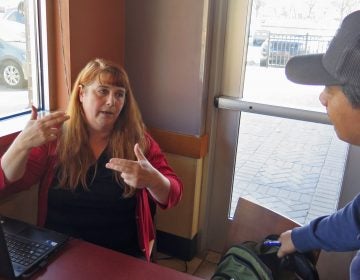Three Pa. cities vary widely in how they take advantage of coveted state ‘improvement zone’ status
The program aims to ignite investment in historically hard-to-develop neighborhoods by allowing developers to use tax revenue to pay off things like construction debt.

Lancaster Central Market is in the city's Community Revitalization & Improvement Zone. The program lets participating cities keep some state taxes to fund redevelopment. (Emily Previti/WITF)
In 2013, Pennsylvania created the City Revitalization and Improvement Zone (CRIZ) program in hopes of spurring economic growth by allowing a few select communities in the commonwealth to reinvest tax dollars that normally would go to the state or local government.
The program aims to ignite investment in historically hard-to-develop neighborhoods by, for instance, allowing developers to use tax revenue to pay off things like construction debt.
A few years into the program, results have varied in the three communities the state has granted a CRIZ: Tamaqua, Bethlehem and Lancaster.
Bethlehem’s zone has garnered tens of thousands of dollars per year, coming from a distillery that opened a couple years ago and construction on other sites, many of which were vacant.
Tamaqua’s CRIZ funding has been at least $150,000 annually.
And Lancaster’s zone, located in the heart of the city, generates the most revenue by far: $3.7 million last year, according to the state Department of Revenue.
But a big chunk of those funds aren’t being used for new development.
Nearly 20 percent is earmarked for the maintenance of the Lancaster County Convention Center, a commitment that helps the facility to avoid financial ruin threatened by the terms of a refinancing plan brokered years before Lancaster got its CRIZ.
So, does that amount to a state-subsidized bailout of a questionable local policy? Or a needed boost to a community trying to redefine itself?
Tax-increment financing
To answer that question, it’s important to know more about how these improvement zones work.
The logic behind CRIZ payments is that of “tax-increment financing.” The zones receive money based on how certain state and local tax revenue has grown compared to the levels seen before the improvement zone was created.
That incremental increase then goes into a special fund overseen by a locally-appointed authority.
In theory, as these funds are reinvested in communities, a cycle is created that makes the area more stable and attractive for private businesses and developers.
Experts on tax-increment financing say that’s the lens through which to judge the use of CRIZ funding.
“It might be that by keeping that convention center above board, that helps surrounding businesses,” said David Merriman, a visiting fellow at the Lincoln Institute of Land Policy, a Cambridge-based think tank. “The government making the pre-commitment to say, ‘We’re not going to let this thing go down, and the way we’re going to show you that is we’ve actually got a separate set of revenue that we’re going to dedicate to it,’… that can give the private sector some confidence, which will help them to invest.”
That was the thrust of the discussion by local officials, at a county commissioners meeting in 2014.
They also said the county could’ve been on the hook for nearly $60 million to cover losses and penalty interest rates tied to an agreement struck in 2011. But the bank agreed to renegotiate – with certain conditions. One was having money on hand for maintenance of the convention center, which the CRIZ funding is now providing.
Absent that, it’s difficult to guess how the situation would have evolved.
“It’s possible … that the investors would’ve had to take a haircut, that the banks would have had to just loosen their terms and this could be bailing out those guys who made a mistake by investing in this,” Merriman said. “That’s kind of a strategic question that [local officials] had to face, … But, if you’ve got a major convention center in a given area of the city and that goes down, in theory, there are bad things that are going to happen.”
Lancaster and Bethlehem CRIZ authorities have also issued debt to finance development within their respective zones.
But not all the money’s tied up in loan agreements.
Some CRIZ funding returns to the business within the zone, but that’s not automatic. In all three communities, businesses have to apply and CRIZ authorities make decisions on a case-by-case basis.
Lancaster and Bethlehem have a dozen deals between them.
Tamaqua is moving slowly by comparison. It’s struck just two such agreements in as many years, and for smaller-scale projects.
Critics
Regardless of how the money is spent, critics question the logic of tax incentive programs and whether they drive private investment that truly would not occur in these communities otherwise.
The Commonwealth Foundation, a right-leaning Harrisburg think tank, says resources used to create and implement programs like CRIZ would be better used to help reduce the state’s corporate tax rate.
The foundation says beneficiary communities and projects are often picked for political reasons.
To truly improve outcomes in the state’s struggling cities, they advocate instead for larger policy changes, such as overhauling the state’s municipal pension system.
WHYY is your source for fact-based, in-depth journalism and information. As a nonprofit organization, we rely on financial support from readers like you. Please give today.






